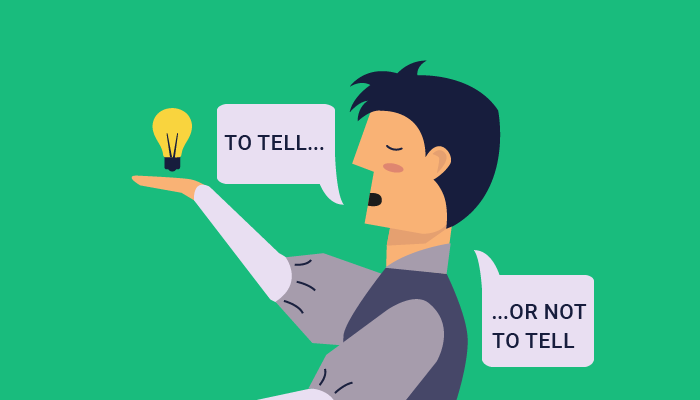What’s more valuable, your idea or your secret?
This is the problem that every entrepreneur is faced with. You come up with an idea that you believe is the bomb, and you don't want to share it with anyone else. It's your baby. Your gift to the world. Your goose that will lay billions of golden eggs. Or something more noble, that will end world hunger or achieve world peace. But alas, there have been thousands if not millions of these ideas floating around in people's heads and intentions, and one of them may have solved the problem of global warming, but we'll never know, because those people never told anyone about it. Larry Page has said that: "You need to invent things and you need to get them to people. You need to commercialize those inventions." In other words, what good is an idea if it is born and dies in your head?
Let's break down the process, and weigh the advantages and disadvantages of letting people know about your idea vs keeping it a secret until the big unveiling.

Keep it locked up in the most secure place ever
Let's think about this in cool terms. Imagine you're an (even more important than) top secret agent, and you have to do things. Every step step you take, and every move you make, is going to be "classified". Your best friend asks you what's new with your life, you say: "it's classified". Your boyfriend asks you if you want to go out this weekend, and you say: "it's classified". You get where I'm going with this. This is the biggest problem.
Keeping your idea secret until you turn it into a product is the biggest challenge. Not only do you have to do everything yourself, it is also going to cost you more time and money. Then, after decades of work, when you finally unveil the product, the reception by end users is a gamble. Unless you're the kind of company that is named like a Beatles record label, likes to hoard billions of ca$h, and your whole advertising strategy is based on secrecy, then go ahead. Otherwise, it just isn't worth it.
Tell everyone about it
First off, you have to understand, that if you're able to come up with one idea, you are able to come up with another. That's why the phrase "serial entrepreneur" exists. It's not like people are alloted a set number of ideas at birth and you use them up during your life. Necessity breeds creativity, and that's how humans have evolved to the point where you can order condoms by pressing one button.
Usually, when you come up with an idea, and you feel compelled to turn it into something, it's not like everyone you talk to about it is going to feel the same way about it. There are probably people right now that are devising or have already come up with ideas to make e-cigaretes less obnoxious, and good for them, it'll probably lead to less smokers, but it's not something that's going to compell me to start the Cool Vaping Company. The odds of finding someone that feels about an idea the same as you do, are slim.
That's why we advocate rapid prototyping. Quickly turn your idea into 'something', and get it out there, have people react to it. Then based on user feedback, you improve, iterate and move on. Yes, this is another post about getting your product out as soon as possible, and not hold back until you polish everything. This is not something revolutionary. It's a tried and tested method. The first computer made by Steve Wozniak didn't look even close to a Braun appliance rip off. But the ones made by his company a couple of decades later did. Have a look at this old news article. Do those websites seem like good and polished executions of ideas? Not even for their time. Get your idea to people, and then react.
What about if someone steals your idea? Well the Chinese have been doing that for decades. Also, the most recent and famous example is Instagram, with their Stories. Snapchat has been around for 5 years. They're a good successful company. Instagram comes along, and just blatantly chops a piece of their pie, and is eating it while maintaining eye contact (to assert dominance). Arguably Samsung has done that to Apple as well. So, it's not about the idea, it's the follow through.
Conclusion
You believe that you've come up with something, try and make it happen. As quickly as possible as simply as possible. If you're aiming to compete in the half pipe Winter X-Games, you first learn to ride a snowboard, and then you attempt to nail a 1440.
Get your idea out there, and see what happens. If people like it, it'll serve as motivation to make it better. If people don't like it, then you can tweak it for them to understand it better. If they still don't like it, you come up with something different. The ideas for Slack, or Instagram weren't conceived in the form they are now. Slack was part of a communication feature of a game. Kevin Systrom was making a location based app, the focus of which wasn't on filtered photos. So, test and collaborate, don't hide. If a great idea is executed, the world becomes a better place independent of who the executioner is. If it's you, great, you're rich. If it's not you, then you'll come up with something better soon enough (and then get rich).